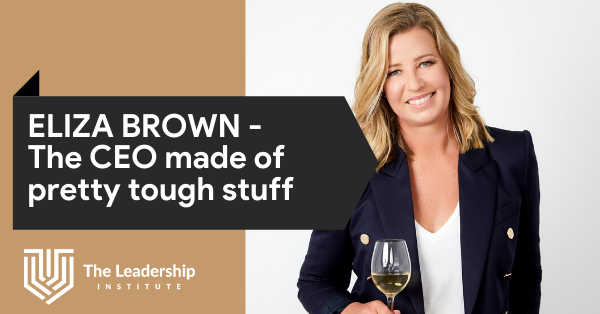Eliza Brown is not your typical CEO. For a start she’s winemaking royalty; she’s a Brown of the Brown Brothers, and she’s the fourth generation of the Brown winemaking legacy. She also didn’t want to be a CEO.
Starting on “the bossy suit side” of advertising, as she puts it, rather than the creative side, she worked for top advertising agencies before her dad called her out of the blue and asked if she wanted to join his stand-alone business venture, All Saints Wines.
Her father, an artful winemaker, bought All Saints off the Brown Brothers suite to go it alone. Wine he could do, marketing he could not. Eliza covered “a maternity leave” position that ended in her staying for four years.
She may have been happy working alongside her dad in marketing at All Saints, but an accident changed the course of her life forever. On an ordinary Sunday afternoon, her father was knocked from his motorcycle by a car and killed.
Her world was shattered. One minute she was working in the business, expecting her first child, her life is moving along smoothly, and the next she has lost her mentor, her father and the business she helped build was without its leader.
Her brother was studying winemaking in Adelaide, her sister running a graphic design business in Melbourne, living their lives unaware that tragedy was about to hit.
Eliza recounts, “That was a Sunday, and then we have to take over the business on Monday. I didn’t really have any experience in running a business, even though I had been working with dad for four years, he didn’t give me any insight into financials or anything like that.”
She pauses and continues, “When the bank manager turned up the next day asking me to sign personal guarantees that I didn’t understand anything about, and I did just that (signed the papers). There were so many little things. And then we had a court case at the same time, and it was messy. I look back on it now, and I think that how I got through it, but women don’t just end up just doing it. I didn’t ask enough questions when dad was alive.”
“I became CEO the next day. I didn’t have much of a choice.”
Fortitude, I feel is an understatement when describing Eliza Brown. She shrugs off this enormous tragedy as if surviving of a loss of this magnitude personally and professionally was not an amazing feat.
“I remember someone saying to me, ‘this possibly won’t be the worst thing that will ever happen to you…’ and you have to put things into perspective, and I had my brother and sister, my mum as support. I’d find her to have a bit of a cry with and I had them as backup. I think that trying to do something like that by yourself is bloody difficult.”
Grieving and stunned by the sudden loss, Eliza and her siblings had to make a choice. “There were three options. Sell up. Get someone in to manage it for us. Or do it ourselves.”
With her sibling’s support, Eliza took the helm of All Saints as it’s CEO. Today, her sister Angela runs their marketing, and her brother Nicholas is the winemaker. When they sat down to discuss what to do with the business, they made a pact, “we sat down the day after and said, what should we do? Should we sell, we get a manager in, or we do it ourselves. And we all decided that we do it ourselves. But we also decided that when we started to hate each other, we sell because our relationship is more important than a business.”
Despite her siblings backing, Eliza felt hideously under prepared and uninformed about the financial and strategic side of the business. “I didn’t really have any experience in running a business even though I had been working with dad for four years, but he didn’t give me any insight into financials or anything like that.” I wonder how long it took her to overcome that feeling, to start feeling empowered and capable in her role.
“It was a massive learning curve. A lot of people left. They really didn’t know whether I was up to the job.”
“I think at that stage I didn’t feel very empowered because I didn’t have the knowledge that I do now… when you’ve got the knowledge and a confidence in your decisions, that’s when you feel empowered. It made me work really hard to build my knowledge around every part of the business and ask questions.”
“One of the biggest hurdles was to trust my own decisions. I think that’s been the biggest hurdle because you constantly doubt yourself. Then I realised after I spend a lot of time with men on boards that they don’t doubt themselves at all. They look in the mirror completely convinced of their decision-making process, even if they hadn’t done the background work, and I thought, well, I’m still doing all the background work, and I’m still feeling nervous about my decision, and I shouldn’t just trust what I know and what I’ve learnt? And that’s taken quite a long time. But I think that’s better than being arrogant about your decisions in the early days.”
Echoing the sentiments of other CEOs I have interviewed throughout the year, Eliza believes that a little bit of fear, a little lack of confidence can help you stay motivated and pressed to do even better, “I don’t ever feel completely competent, and I think that if you do, that’s when things start to fall away. You’ve always got to be a little bit scared or a little bit hungry.”
With her surprising and refreshing frankness, Eliza is open about her awareness that others in the tight-knit wine-growing community may have viewed her stewardship of the vineyard as an inheritance rather than something she either earned and deserved to take. She also felt that most people backed her to fail and some, more selfishly, worried about what her failure would mean for the wider community.
“The biggest hurdle is to trust your own decisions because you’re constantly doubting yourself.”
To prove them wrong she knew she would have to work harder than she knew she was capable of, “people have an expectation of you because of your last name and if I worked harder and did put my hand up for a lot of… I would be seen as somebody that is going to give 150%. If I sat back and didn’t put my hand up for a lot of those things, I don’t think I would be as respected.”
But Brown didn’t do it alone; she is the first to admit she got help and got it fast. She was out of her depth with the financial side of the business, and she needed strategic advice. So, she got it. She set up a board to help govern the winery and provide advice on the broader market. She had some young people that she trusted but also knew she needed experience, “a bit of grey hair” to ensure she had the right advice.
“You won’t have to do it all yourself, that’s why you need good people around you to help.”
She recounts her lack of financial acumen as her biggest weakness and the area she needed the most support, “I remember Dom (the accountant) coming to see us when dad died on the Sunday, he came and sat with us on that on Monday says, “Look, you’ve got a big leaky bucket, you’ve got eight holes just leaking money and you need to work out how you’re going to plug all those holes and I’m going to come back next week and you’ll give me a solution.”
Financial acumen, she now believes, is the number one skill we should be teaching young women. “it’s just so important to have those financial skills. And I wish I had done accounting at school now. Even though it’s possibly the most boring thing in the world. I was told from an early age that I was terrible at maths and that I wouldn’t need it and I think this is why I struggled. Now I love financials, and I love seeing how we are going each month.”
She also believes we should be filling girls with self-confidence is first and foremost skill we should be instilling in girls. “I remember someone saying to me, “Get up in the morning and look in the mirror and be happy with who you see in the mirror every day.” And I think that’s important. Oh and financial skills.”
Despite all the pressure and the trauma of those first few years, Brown has definitely proven everyone wrong. Her winery has a five-star Halliday rating, and the winery’s restaurant has held the “one chef hat” rating consistently for the last six years. Added to this list of achievements (which she quietly did not mention) is the Future Leader of the Australian Wine Industry award from the Winemakers Federation of Australia and her participation as the sole Victorian representative on a 10-member agricultural advisory committee, set up by then Agriculture Minister Barnaby Joyce.
As a side project, because there wasn’t already enough on her plate, she and her two siblings =have recently completed a renovation of a nearby property they purchased to produce a niche boutique accommodation space and together they purchased and made profitable a second vineyard, St Leonards Vineyard.
She had offers to make this project into a reality TV series which they did not take up because as Eliza says, “we were too nice to each other, there was not enough drama.” But the financial pressure of these ventures was both overwhelming and motivating.
“What drives us is having that little bit of pressure. Being a little bit scared all the time.”
“I quite like the feeling of having a bank manager behind me because that drives me. When you see his number coming up on the phone and feeling the fear. But it’s having that accountability and making sure that things work and working hard to the end. Yeah and I think that’s what drives us. Having that little bit of pressure. Be a little bit scared all the time.”
I am astounded she can stand up to that pressure and has the time and inclination to maintain the various business and the same time as raising two children. She says she is able to balance both by tying to be organised.
At the same time as telling me this sincerely, she laughingly tells me she sent her daughter to school with two pairs of underpants. She does, however, cite choosing the wrong partner early in life one of her greatest mistakes and maintaining her current partnership with her husband one of the biggest success factors in keeping her life running smoothly.
The teamwork involved in the domestic side is vital to achieving and maintaining success. “I’ve had a home life that’s not supportive, and that’s an absolute disaster. Not being supported was what I experienced when my dad died, and we parted ways. That was a disaster. Absolute disaster. I said to myself that if I’ve ever met another person that we need to work together as a team.”
A team seems to be what she has found with husband Dennis, a Melbourne restaurateur who provides support and advice behind the scenes and of course there’s her two siblings, with whom she is ridiculously close. “The three of us have a very, very similar sense of humour. I think that helps. We don’t take ourselves too seriously. And if we start taking ourselves too seriously one of us want to kill each other. But despite that, we enjoy our life together.”
While she is supported, both within her marriage and from her siblings, I have no doubts that Eliza Brown would have been a powerhouse with or without them. But this story of pain, triumph, support is atypical from many of the stories I hear in the female leadership space. Brown is not your typical story of knifing your way to the top, crashing through a glass ceiling and fighting to stay at the top.
Her leadership was thrust upon her, and she rose to the occasion. Her self-deprecation is more than just modesty; it’s an understanding that while her success is important, being happy and content with her life and celebrating each day is just as important and I hang up the phone not just wanting Eliza to be my friend but also wishing to be welcomed into her world.



